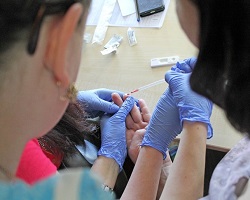Rapid HIV testing saves lives – it’s time to make the switch

Association “Youth for the Right to Live”, Balti, Moldova
Today WHO issued a strong recommendation on HIV testing, urging countries to stop using the slow, less accurate western blot and line immunoassay methods in favour of simple, rapid tests.
It is vital that people who are unknowingly living with HIV are tested and given antiretroviral treatment (ART) without delay. ART prevents HIV from developing into AIDS and, once the virus level in the blood is so low it is not detectable in a blood test, it enables people to live with the virus without passing it on to others.
Dr Masoud Dara, Coordinator for Communicable Diseases at WHO/Europe, said: “Rapid HIV testing saves lives by making testing more accessible and reducing waiting times. When such testing is conducted in the community with a caring and people-centred approach, people are more likely to come forward to be tested. If the test is positive, then treatment should follow as soon as possible; if the test is negative, then there’s an opportunity for advice on steps to avoid future infection, such as taking HIV pre-exposure prophylaxis and using condoms. Either way, testing is where care starts.”
New testing strategies lead to quicker, more accurate results
Today’s recommendation follows a rigorous analysis of the latest available evidence and the systematic review of current practice that WHO conducted while revising its global recommendations on HIV testing services this year.
The review compared testing strategies that use western blot/line immunoassay methods for confirmation of HIV diagnosis with those that use a combination of rapid diagnostic tests that can be given at the point of care and enzyme immunoassays. It found that testing strategies using rapid diagnostic tests combined with enzyme immunoassays were faster, more accurate and less expensive overall. The analysis is summarized in a policy brief, and the global recommendations will be published to mark World AIDS Day on 1 December.
Late diagnosis can kill
Late diagnosis of HIV remains a challenge across most of the countries in the WHO European Region: according to estimates, only 82% of the people living with HIV in the Region are aware of their status. When this is narrowed down to eastern European countries, only 74% know their status. This makes the recommendation particularly relevant for the Region.
Every second newly diagnosed person has already reached an advanced stage of infection by the time their diagnosis is confirmed. Using western blot and line immunoassay methods as confirmatory tests can take many weeks, and delays the initiation of live-saving ART. Many patients never return to have their results confirmed. The consequence has been an increase in the rates of AIDS cases and deaths that could have been avoided if action had been taken earlier.
Yet, with new technologies to assure speedy confirmation of results, being tested for HIV has never been easier. Moreover, in many countries across Europe, peer counsellors – who are not necessarily medical professionals but have received special training – give advice and support and are able to deliver results in a matter of minutes at community-based testing facilities.
Unfortunately, few countries have adopted the latest HIV testing strategies. Often this delay is related to factors such as legislative barriers or reticence about changes in procurement and laboratory equipment.
WHO/Europe encourages countries to join the European Testing Week initiative. European Testing Week is a region-wide campaign that encourages various organizations to maximize their efforts for 1 week twice a year, in May and November. The focus is on promoting early testing for HIV and hepatitis, raising awareness, and increasing access to testing services and appropriate follow-up. The campaign runs from 22 to 29 November 2019.



